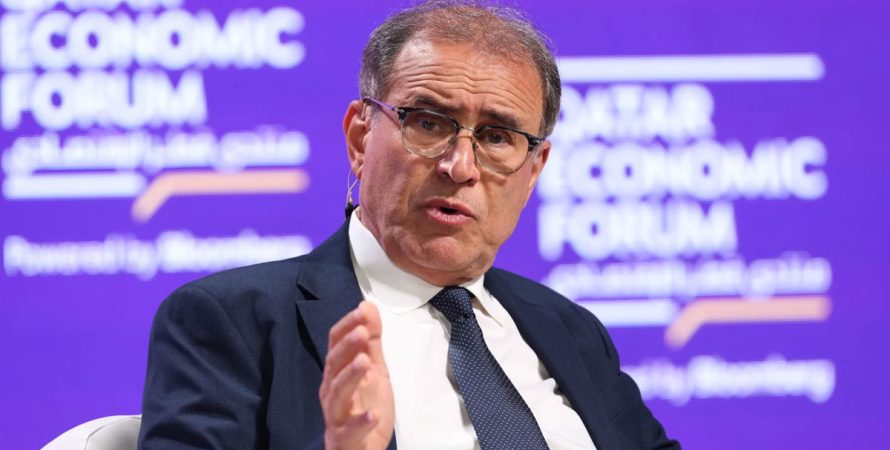SPECIAL NOTE: The views and opinions expressed by Dr. Nouriel Roubini, or any people mentioned in this article, are for informational purposes only, and they do not constitute financial, investment, or other advice.
Renowned economist Dr. Nouriel Roubini, in a recent MarketWatch op-ed, discusses the precarious situation faced by investors and banks.
Nouriel Roubini has held the position of Professor Emeritus at the Stern School of Business, New York University, since 2021, after serving as a Professor of Economics from 1995 to 2021. Additionally, he is the CEO of Roubini Macro Associates, LLC, a New York-based global macroeconomic consulting firm, and the Co-Founder of Rosa & Roubini Associates, headquartered in London.
In 2018, Roubini called blockchain “a glorified Excel spreadsheet” and “one of the most overhyped technologies ever.” As for Bitcoin, as far back as 2014, he was attacking it, calling it “a Ponzi scheme,” a “lousy” store of value, and “a conduit for criminal/illegal activities.”
He highlights that by the end of 2022, U.S. banks’ unrealized losses on securities reached $620 billion, approximately 28% of their total capital ($2.2 trillion). Roubini also points out that the rise in interest rates has led to a decrease in the market value of banks’ other assets, and when accounting for these factors, U.S. banks’ unrealized losses actually amount to $1.75 trillion, or 80% of their capital.
Stay in the know on crypto by frequently visiting Crypto News Today
According to Roubini, the “unrealized” nature of these losses stems from the current regulatory regime, which allows banks to value securities and loans at their face value rather than their true market value.
He asserts that most U.S. banks are technically near insolvency:
“In fact, judging by the quality of their capital, most U.S. banks are technically near insolvency, and hundreds are already fully insolvent.“
Roubini explains that rising inflation reduces the true value of banks’ liabilities (deposits) by increasing their “deposit franchise,” an asset not on their balance sheet. He further states that this asset only exists if deposits remain with banks as rates rise. However, experiences from Silicon Valley Bank and other U.S. regional banks reveal that deposit stickiness is not guaranteed. If depositors withdraw their money, the deposit franchise evaporates, and unrealized losses on securities become realized as banks sell them to meet withdrawal demands, leading to bankruptcy.
In his op-ed, Roubini also mentions the “deposit-franchise” argument, which assumes that most depositors will keep their money in accounts bearing near 0% interest instead of earning 4% or more in safe money-market funds. However, he asserts that depositors are not so complacent. The current flight of uninsured and even insured deposits is likely driven by both the pursuit of higher returns and concerns about deposit safety.
Roubini emphasizes that the interest-rate sensitivity of deposits has returned after being a non-factor for the past 15 years. He suggests that banks assumed a foreseeable duration risk to increase their net interest margins and criticizes regulators for not subjecting banks to stress tests to see how they would fare in a scenario of sharply rising interest rates.
Finally, Roubini argues that central banks face a trilemma due to recent adverse aggregate supply shocks, such as the COVID pandemic and the war in Ukraine. Achieving price stability through interest-rate hikes raises the risk of a hard landing but also the additional risk of severe financial instability. He warns that central banks may “wimp out” to avoid an economic and financial meltdown, setting the stage for a de-anchoring of inflation expectations over time. Roubini calls for everyone to prepare for the coming stagflationary debt crisis.
Last month, Roubini expressed his concerns about the risks associated with cryptocurrencies during a conversation with Stansberry Research’s Daniela Cambone. He emphasized that the crypto market is highly dangerous and riddled with frauds and criminals, pointing out that the entire crypto house of cards seems to be collapsing. Roubini suggested that crypto is not the place to be if someone seeks to preserve their wealth.
Roubini also mentioned the significant volatility of Bitcoin, noting that just over a year ago, its value was around $69,000, but it has since dropped to between $19,000 and $20,000, losing around 80% of its value. He added that other top-10 cryptocurrencies had experienced even more significant losses. Furthermore, Roubini highlighted the recent collapses of two major crypto banks, Silvergate and Signature Bank, which he claimed were involved in risky activities, putting depositor funds at risk.![]()
Read More at CRYPTOGLOBE
Please Read Essential Disclaimer Information Here.
© 2024 Crypto Caster provides information. CryptoCaster.world does not provide investment advice. Do your research before taking a market position on the purchase of cryptocurrency and other asset classes. Past performance of any asset is not indicative of future results. All rights reserved.
Contribute to CryptoCaster℠ Via Metamask or favorite wallet. Send Coin/Token to Addresses Provided Below.
Thank you!
BTC – bc1qgdnd752esyl4jv6nhz3ypuzwa6wav9wuzaeg9g
ETH – 0x7D8D76E60bFF59c5295Aa1b39D651f6735D6413D
MATIC – 0x7D8D76E60bFF59c5295Aa1b39D651f6735D6413D
LITECOIN – ltc1qxsgp5fykl0007hnwgl93zr9vngwd2jxwlddvqt





